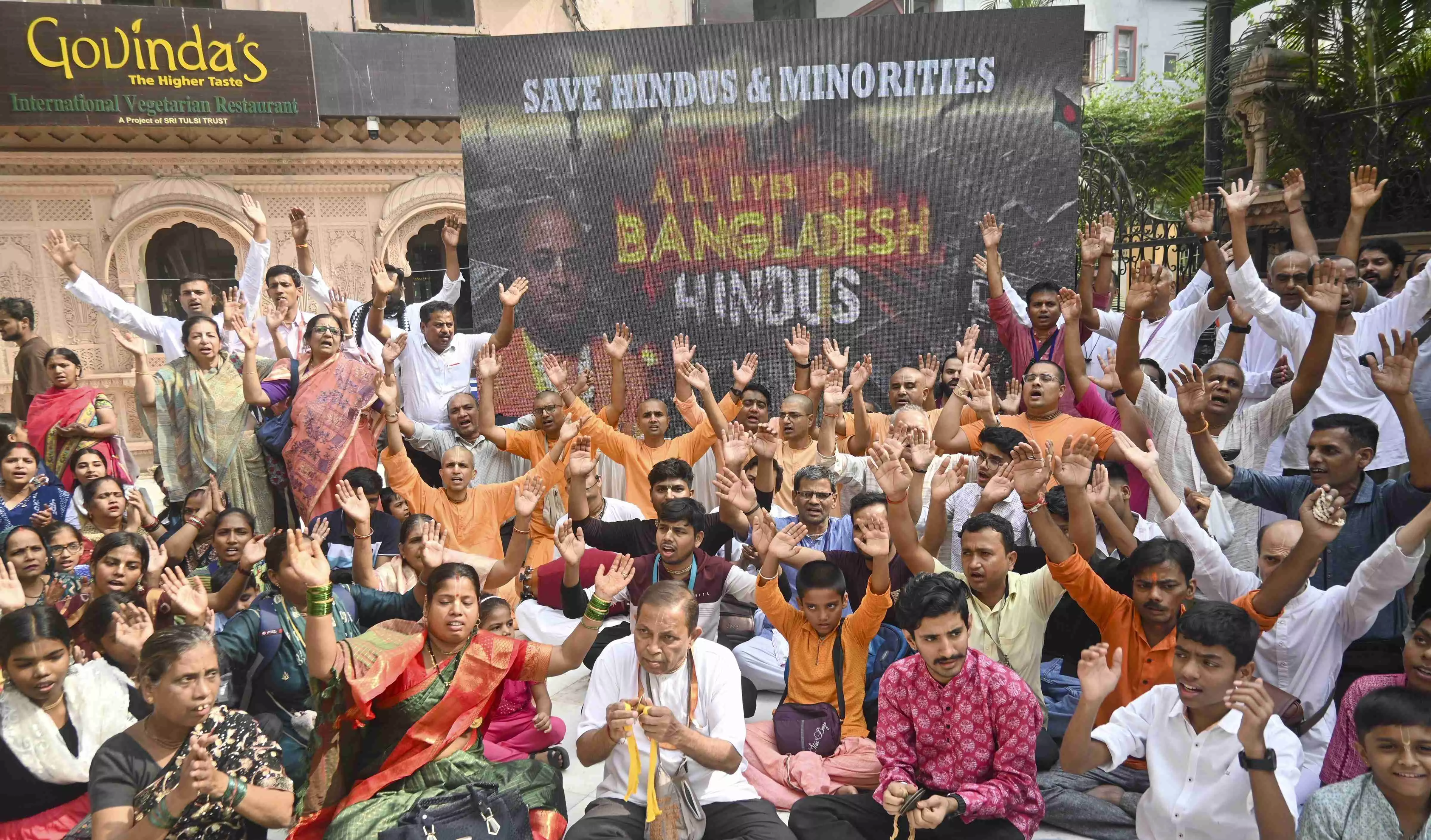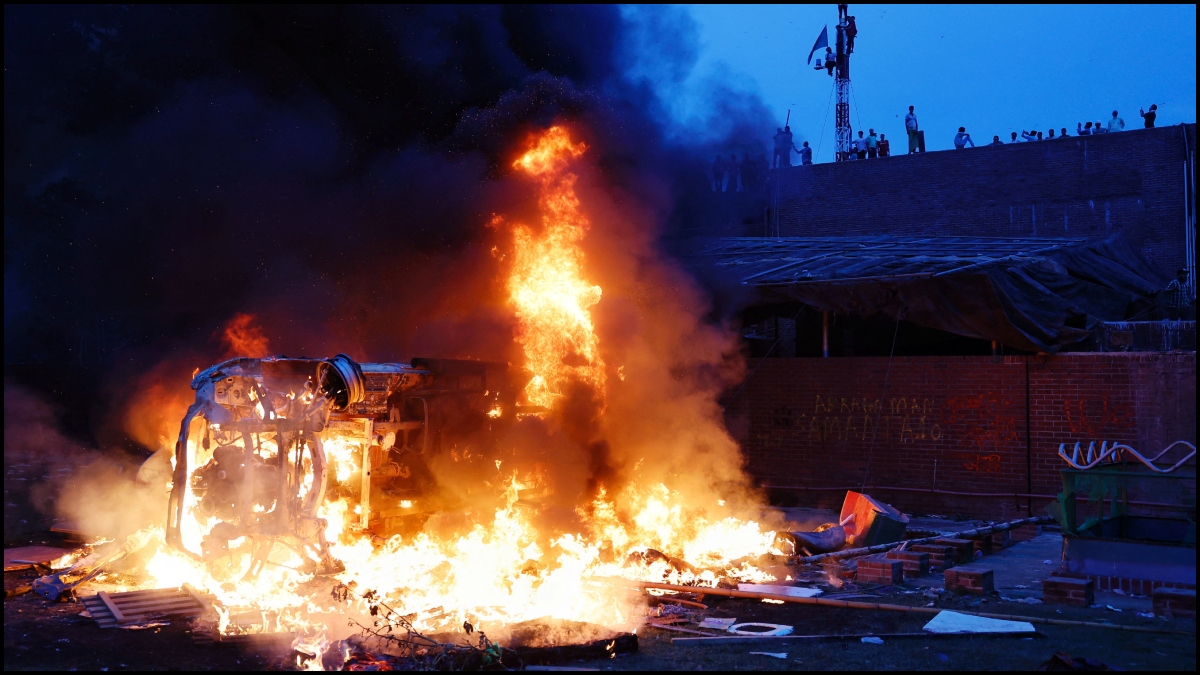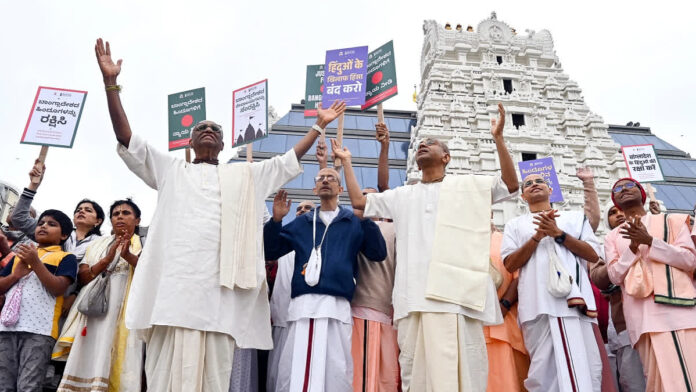The International Society for Krishna Consciousness (ISKCON) has reported that its Namhatta Centre in Dhaka, Bangladesh, was burned down early Saturday morning in what it alleges was a targeted attack. The incident marks yet another episode of violence against Hindus in Bangladesh, raising serious concerns about the safety of minority communities under the interim government led by Muhammad Yunus.
ISKCON Alleges Premeditated Attack
ISKCON’s Kolkata vice president, Radharamn Das, revealed the incident in a post on X (formerly Twitter). He stated, “ISKCON Namhatta Centre burned down in Bangladesh. The deities of Sri Sri Laxmi Narayan and all items inside the temple were burned down completely. The centre is located in Dhaka.”
Das further elaborated, saying that the fire occurred between 2-3 AM at the Shri Shri Radha Krishna Temple and the Shri Shri Mahabhagya Lakshmi Narayan Temple, which are part of the Hare Krishna Namhatta Sangha. According to Das, the attackers gained access by lifting the tin roof at the back of the temple and used petrol or octane to ignite the blaze.
The ISKCON official also shared the address of the affected site, located in Dhour village under the jurisdiction of Turag Police Station in Dhaka district.

Rising Concerns Over Safety of Minorities
Speaking to PTI, Radharamn Das expressed his frustration over the lack of action from local authorities. He said, “Targeted attacks on members of the community go on unabated. Despite ISKCON drawing attention to the interim government in Bangladesh, not much is being done by the police and administration to assuage our grievances and address our concerns.”
This incident is not an isolated one. ISKCON properties across Bangladesh have reportedly been targeted over the past four months, coinciding with the political instability following the collapse of Sheikh Hasina’s regime in August.
A Troubling Pattern of Violence
The recent wave of violence against Hindus in Bangladesh has drawn international attention. Reports indicate a significant increase in attacks on minorities, particularly Hindus, under the interim government of Muhammad Yunus. The rise in extremist rhetoric and incidents of violence have sparked fears within the Hindu community, which constitutes a vulnerable minority in the Muslim-majority nation.
India, too, has voiced its concerns over the escalating violence. Last week, the Indian government urged the interim government in Bangladesh to fulfill its responsibility of protecting minority communities. A spokesperson for the Ministry of External Affairs said, “India expresses serious concern over the surge of extremist rhetoric and increasing incidents of violence against Hindus in Bangladesh.”

Repeated Attacks on ISKCON Properties
ISKCON centres have become frequent targets in Bangladesh’s volatile environment. From Chattogram to Dhaka, properties belonging to the religious organization have been vandalized, and its members have faced threats and violence.
In one notable incident, an assistant government prosecutor, Saiful Islam Alif, was killed during a protest in Chattogram after a monk affiliated with ISKCON was denied bail. The monk, identified as Das, has faced legal challenges and threats, further highlighting the precarious situation for ISKCON members in the region.
On December 3, a Bangladesh court deferred a hearing on Das’s bail petition as no lawyer appeared on his behalf. This incident underscores the systemic challenges faced by the Hindu community in accessing justice and ensuring their safety.
Government’s Inaction Draws Criticism
The lack of a decisive response from the interim government has drawn sharp criticism from both domestic and international observers. Activists and community leaders have accused the administration of failing to provide adequate security to minorities and allowing extremist groups to operate with impunity.
While local police have launched investigations into incidents like the Dhaka temple fire, progress has been slow, and perpetrators often remain at large. ISKCON officials have called for immediate action to protect their community and properties, emphasizing the need for stronger measures to prevent such attacks.

International Repercussions
The ongoing violence against Hindus in Bangladesh has strained the country’s relations with India, its largest neighbor and key ally. India has consistently raised the issue of minority rights with Bangladesh’s leadership, urging them to take swift action to curb extremist activities and ensure the safety of all citizens.
Human rights organizations, too, have called for international intervention to address the deteriorating situation. They argue that the attacks on ISKCON properties and other Hindu establishments are part of a broader pattern of religious intolerance that threatens Bangladesh’s secular fabric.
Community’s Call for Unity
Amidst the turmoil, the Hindu community in Bangladesh has shown remarkable resilience. Religious leaders and activists have urged their followers to remain united and continue advocating for their rights. Efforts are also underway to rebuild damaged temples and provide support to affected families.
In Dhaka, ISKCON members have organized prayer meetings and gatherings to raise awareness about the attacks and seek solidarity from the global Hindu diaspora. “We will not be silenced. Our faith and community will endure, no matter the challenges,” said a senior ISKCON official during a recent event.

A Critical Moment for Bangladesh
The series of attacks on Hindus and ISKCON properties have brought Bangladesh to a critical juncture. The interim government’s ability to restore law and order, protect minority communities, and uphold the principles of secularism will determine the country’s future stability and international standing.
As the world watches, the Hindu community in Bangladesh continues to call for justice, hoping that their voices will be heard and their rights safeguarded in the face of mounting challenges.

